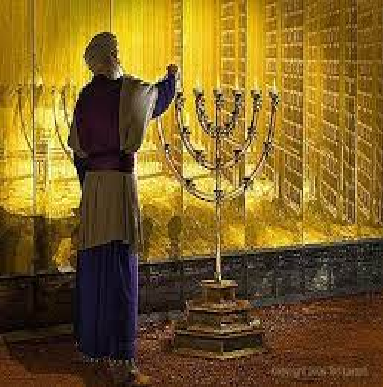Exodus 27:20 וְאַתָּה And you will command אֶת־ Children of Israel that they bring you pure olive oil beaten for the light, so that the lamp will burn continuously. 21 In the Tabernacle of the Congregation outside the veil, which is in front of the testimony, shall order אֹתֹו it (him), Aaron and his sons will keep it burning from evening to morning before יהוה: it will be a statute forever to their generations מֵאֵת from the Children of Israel. C-MATS
Question: What does the word “command” mean in this verse? The word tetzaveh, “to command”, also means “to connect” and “to bond”. Thus the verse can also be read as יהוה saying to Moses: “And you shall bond with the Children of Israel”. For every Hebrew soul has at its core a spark of the soul of Moses, and we should bond with those who walk in the ways of יהוה. Chumash
Question: How was the oil for the Menorah made? The oil was made by pressing each olive gently until only one drop of pure oil emerged. Afterwards, the olives could be crushed and the remaining oil used for meal–offerings. Chumash
Question: What do the pressed (crushed) olives symbolize? Just as the olive yields light only when it is pounded, so are man’s greatest potentials realized only under the pressure of adversity. Chumash
Question: How can we crush others to bring light? When one speaks crushing words of rebuke, it must be with the sole purpose of enlightening, illuminating, and uplifting one’s fellow brother. Never humiliate and break a fellow-brother. Chumash
Question: What can we learn from the oil that was used in the Menorah? Sometimes the things that knock us down are exactly the things that lift us up. The pure oil that fueled the special lights of the giant menorah in the Tabernacle only came from the olives after they were knocked down, beaten, crushed, and pressed hard. We can learn a lesson from here that when it comes to us, the things in our lives that may make us feel crushed and knocked down can, if we look at them right, also bring the best out of us and ‘light us up’ like never before.

